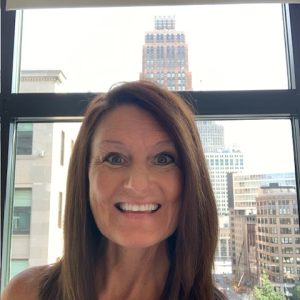Detroitisit, in partnership with the Consulate General of the Kingdom of the Netherlands in Chicago, and the Embassy of the Kingdom of the Netherlands in Washington DC will host the Sustainable Urban Design Summit in an effort to develop creative solutions through a global yet hyperlocal virtual program in partnership with and during the globally recognized Dutch Design Week.
Terry Barclay, President & CEO of Inforum, and member of Sustainable Business Network of Detroit leadership team working to connect global leaders with starts-ups and community members to effect change. Her focus is to help guide and foster healthy and insightful communication to get to the heart of the big issues and challenges.
Join us for a fresh discussion between Dutch and Michigan based progressive leaders working to apply sustainable urban design and circular economy applications in architecture, design, policy, development, mobility, materials sourcing, and re-thinking how cities, citizens in them, their social cohesion, and the buildings that occupy space coexist.
Special Thank You to Sustainable Business Network Detroit in supporting the mission of the Sustainable Urban Design Summit 2021.
The Sustainable Urban Design Summit will take place virtually over Zoom on October 21st at 9:30 am EST and 15:30 CET simultaneously.
Register for your FREE space to attend the Summit on Zoom here: sustainableurbandesignsummit.com
Regarding Detroit’s Sustainable Action Agenda, Terry Barclay, President & CEO of Inforum, and member of the Sustainable Business Network of Detroit leadership team points to collaboration – solving for change collectively – as an element that’s critical and has urgency. And that is the mission of SBN.
Background on the Sustainable Business Network of Detroit; in 2020, the Fred A. and Barbara M. Erb Family Foundation conducted an interview-based study to assess the status of sustainable business efforts in Southeast Michigan. The study revealed that while many local businesses have activated sustainability initiatives, there is an urgent need for collaboration. With global climate change accelerating and equity declining among marginalized populations, the Erb Family Foundation assembled a coordinating team of leaders to join it as partners in a network: the Erb Institute at the University of Michigan, Southeast Michigan Sustainable Business Forum (SMSBF), TechTown Detroit, Wayne State University, and Inforum. The group’s goal is to create a sustainable business ecosystem through a network serving as a hub for idea sharing, programming, content, and mentoring.
We conducted a brief interview with Barclay leading up to the Summit tomorrow to hear more about the SBN’s vision and goals, and actionable items.
There is a global standard of UN sustainability goals, Detroit has a Sustainable Action Agenda – these can all be words on paper, or actionable items that really hold us accountable. How do you plan to produce change?
TB: It’s important to focus on the fact that we have an incredible opportunity here. The current infrastructure investment provides incentive, support, and a means to tackle the major change we need. The key is we need to move quickly – and that takes relationships. One organization or one group is not enough.
SBN feels an urgency about bringing together businesses to build these relationships that are essential to solving huge challenges.
We are focused on leveraging our member organizations to bring broader and deeper networks together to educate and to open more opportunities. That is ultimately how we are hoping to contribute to change.
In terms of sustainable urban approaches and the circular economy, how do we future-proof the steps we take in rethinking the ways we live, work, play, engage in the cities we call home.
TB: Future-proofing gets to the heart of what SBN Detroit is all about. We want to begin with the end in mind and that means really listening to a broader set of stakeholders with many important viewpoints for a sustainable future and adjusted equitable future.
By really listening and being intentional about engaging with this broader set of stakeholders, we begin to create the conditions for sustainable change to occur.
This is our guidepost and a mindset that informs our everyday actions.
Community can and should be a fundamental pillar of sustainability strategies. Looking at BLM, Me Too movements, in terms of the built environment, especially in cities, it can create more social cohesion. How do we bring inclusivity into the design process and more deeply integrate it?
TB: This issue is very close to our hearts at Inforum.
When addressing sustainability and a circular economy, social stability, equity, and justice have traditionally gotten much less focus than the environment has. Now is the time to change that. George Floyd, BLM, Me Too movements, were galvanizing moments for people, communities, and the world.
The question then becomes, how do we sustain this focus? It’s work. Producing change takes ongoing commitment toward the work. Listening and collaborating toward positive and continual collective action are the keys to a new normal that is just and fair and healthy.
What are some interesting community solutions you are seeing when it comes to sustainability issues?
TB: There are some really impressive groups doing impressive work in the city.
One example is the Green Light Fund Detroit, which is completely community-driven in terms of needs, and is leveraging collaborative solutions to address social challenges. They are bringing a fresh vision and ideas in – built from the community up – toward more innovative social sustainability efforts.
We need to work to find ways to support and highlight those in the community who are innovating and succeeding. We need to elevate and celebrate these examples of community solutions to build momentum, and more forward movement toward change.
What do you see as a ‘game changer’ initiative in terms of sustainable urban design or circular economy outputs?
TB: SBN Detroit is laser focused on bringing together businesses of all sizes – from start-ups to Fortune 500’s – with community stakeholders to listen, learn and act together.
We are focused on creating this platform for collaboration across entities that are typically siloed. Bridging the gap between business and community is imperative.
The good news is, we are not starting from scratch. A lot of work has been done and effort put into building the foundations for this collaborative action. We now need to accelerate our efforts to help the region and our business ecosystem succeed. This is the game changer.
As always, be sure to subscribe to our newsletter for regular updates on all things Detroit and more.






















